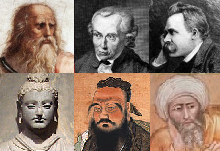Immanuel Kant
|
| This article is about Immanuel Kant is part of part of a series on Philosophy articles |
|---|
You, the reader, should recognize that the sheer brevity of this article would indicate that it is designed to be a seed for commentary and discussion. Tens of thousands of pages have been written about Immanuel Kant by thousands of scholars. It has been the topic of thousands of doctoral thesis's and I do not wish to enter into any form of debate with anyone. Read what it is presented and debate its' merits with someone else. |
| ~ Robin Roberts |
Immanuel Kant (22 April 1724 – 12 February 1804) was a German philosopher and one of the central Enlightenment thinkers. Kant's comprehensive and systematic works in epistemology, metaphysics, ethics, and aesthetics have made him one of the most influential figures in modern Western philosophy.
In his doctrine of transcendental idealism, Kant argued that space and time are mere "forms of intuition" which structure all experience, and therefore that while "things-in-themselves" exist and contribute to experience, they are nonetheless distinct from the objects of experience. From this it follows that the objects of experience are mere "appearances", and that the nature of things as they are in themselves is consequently unknowable to us. In an attempt to counter the skepticism he found in the writings of philosopher David Hume, he wrote the Critique of Pure Reason (1781/1787), one of his most well-known works. In it, he developed his theory of experience to answer the question of whether synthetic a priori knowledge is possible, which would in turn make it possible to determine the limits of metaphysical inquiry. Kant drew a parallel to the Copernican revolution in his proposal that the objects of the senses must conform to our spatial and temporal forms of intuition, and that we can consequently have a priori cognition of the objects of the senses.
Kant believed that reason is also the source of morality, and that aesthetics arise from a faculty of disinterested judgment. Kant's views continue to have a major influence on contemporary philosophy, especially the fields of epistemology, ethics, political theory, and post-modern aesthetics.[26] He attempted to explain the relationship between reason and human experience and to move beyond what he believed to be the failures of traditional philosophy and metaphysics. He wanted to put an end to what he saw as an era of futile and speculative theories of human experience, while resisting the skepticism of thinkers such as Hume. He regarded himself as showing the way past the impasse between rationalists and empiricists, and is widely held to have synthesized both traditions in his thought.
Kant was an exponent of the idea that perpetual peace could be secured through universal democracy and international cooperation, and that perhaps this could be the culminating stage of world history. The nature of Kant's religious ideas continues to be the subject of philosophical dispute, with viewpoints ranging from the impression that he was an initial advocate of atheism who at some point developed an ontological argument for God, to more critical treatments epitomized by Schopenhauer, who criticized the imperative form of Kantian ethics as "theological morals" and the "Mosaic Decalogue in disguise", and Nietzsche, who claimed that Kant had "theologian blood" and was merely a sophisticated apologist for traditional Christian faith. Beyond his religious views, Kant has also been criticized for the racism presented in some of his lesser-known works, such as Anthropology from a Pragmatic Point of View and "On the Different Races of Man". Robert Bernasconi has suggested that Kant "supplied the first scientific definition of race."
Kant published other important works on ethics, religion, law, aesthetics, astronomy, and history. These include the Universal Natural History (1755), the Critique of Practical Reason (1788), the Metaphysics of Morals (1797), the Critique of Judgment (1790), which looks at aesthetics and teleology, and Religion within the Bounds of Bare Reason (1793).
- More information is available at [ Wikipedia:Immanuel_Kant ]
Chat rooms • What links here • Copyright info • Contact information • Category:Root
